Module 9 Population Unit 2 Reading课件+音频(共19张PPT) 外研版八年级上册
文档属性
| 名称 | Module 9 Population Unit 2 Reading课件+音频(共19张PPT) 外研版八年级上册 |
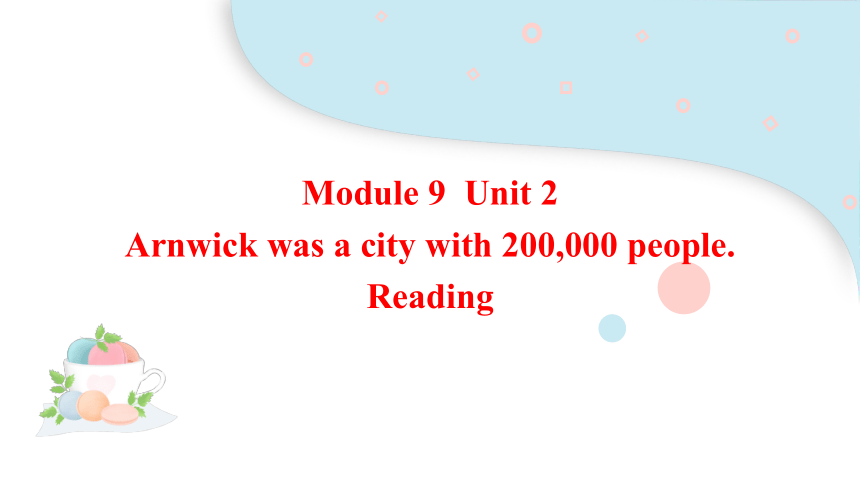
|
|
| 格式 | pptx | ||
| 文件大小 | 4.3MB | ||
| 资源类型 | 教案 | ||
| 版本资源 | 外研版 | ||
| 科目 | 英语 | ||
| 更新时间 | 2024-07-20 10:04:46 | ||
图片预览

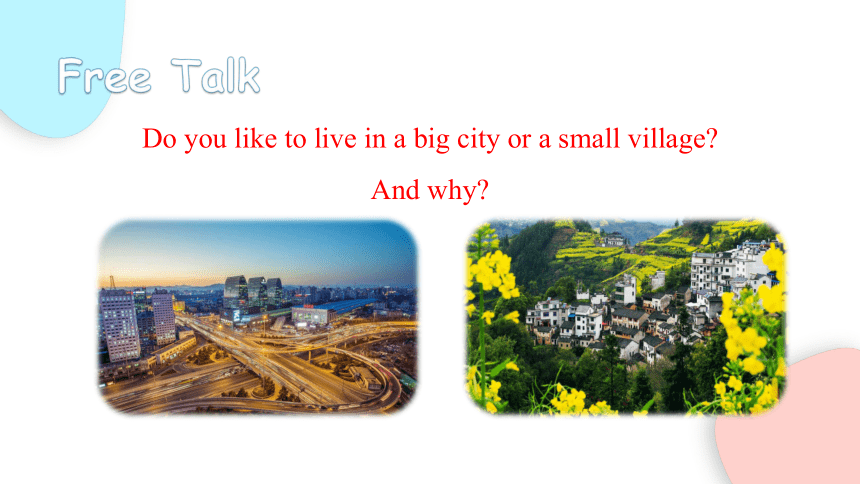
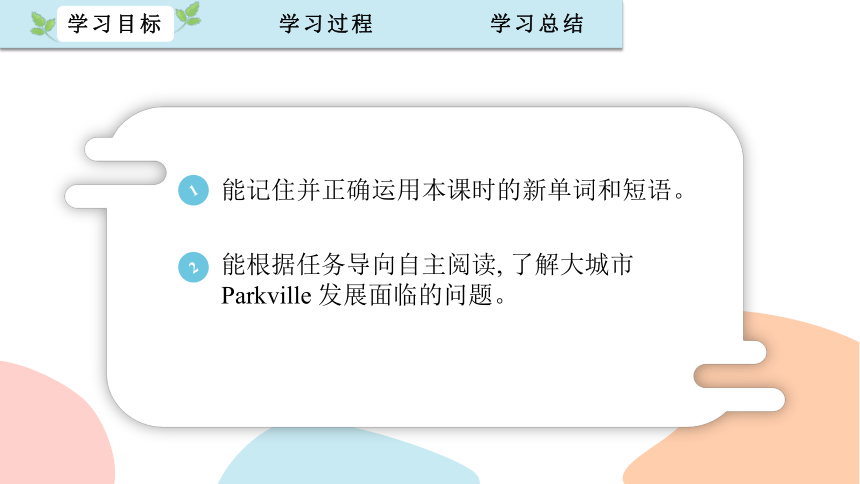
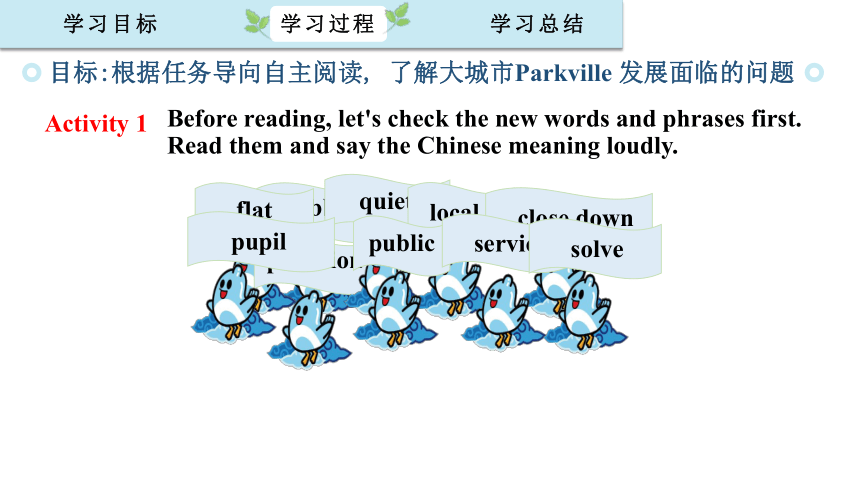
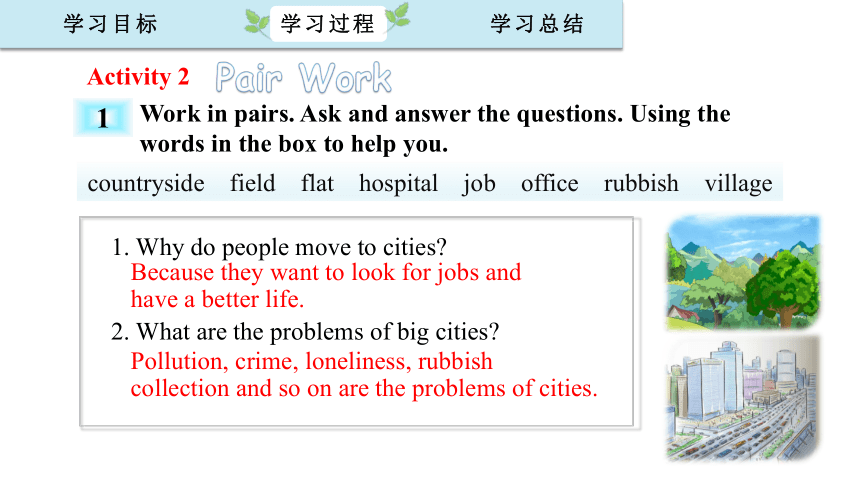
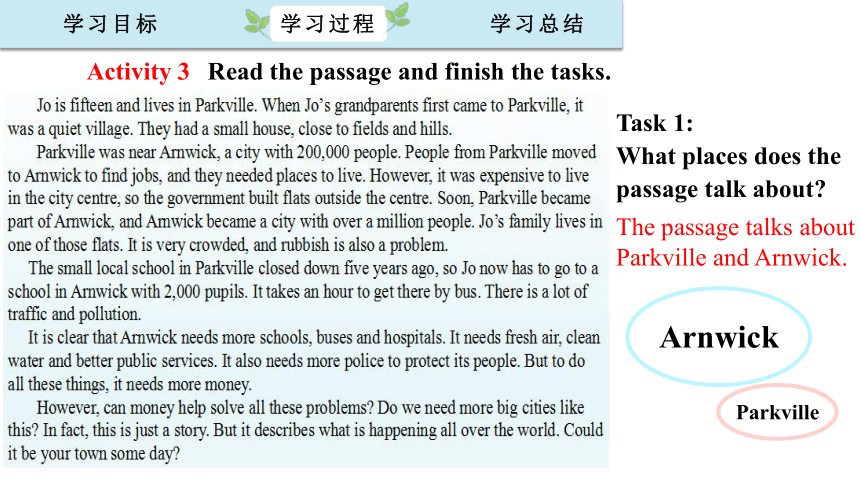

文档简介
(共19张PPT)
Module 9 Unit 2
Arnwick was a city with 200,000 people.
Reading
Free Talk
Do you like to live in a big city or a small village
And why
能根据任务导向自主阅读, 了解大城市
Parkville 发展面临的问题。
1
2
能记住并正确运用本课时的新单词和短语。
目标:根据任务导向自主阅读, 了解大城市Parkville 发展面临的问题
rubbish
flat
pollution
quiet
local
public
close down
service
pupil
solve
Activity 1
Before reading, let's check the new words and phrases first.
Read them and say the Chinese meaning loudly.
Activity 2
1
Work in pairs. Ask and answer the questions. Using the words in the box to help you.
Pair Work
countryside field flat hospital job office rubbish village
1. Why do people move to cities
2. What are the problems of big cities
Because they want to look for jobs and
have a better life.
Pollution, crime, loneliness, rubbish
collection and so on are the problems of cities.
Activity 3
Read the passage and finish the tasks.
Task 1:
What places does the
passage talk about
The passage talks about
Parkville and Arnwick.
Parkville
Arnwick
Task 2: Read quickly and match the paragraphs with the main idea.
Paragraph 1
Paragraph 2
Paragraph 3
Paragraph 4
Paragraph 5
New problems.
The lesson we got from the story.
C. The old Parkville.
D. The new needs.
E. The changes in Parkville.
Task 3.1: Read the para. 1 and answer the questions.
1. Where does Jo live
2.How old is he
3.What was the old Parkville like
4. Where did Jo’s grandparents live in Parkville
They lived in a small house, close to fields and hills.
It was still a quiet village.
Jo lives in Parkville.
He is fifteen.
Task 3.2: Read the para. 2 and fill in the blanks.
Places Changes Reasons
Arnwick The population increased from ________to ____________. People moved to
__________.
The government built more ______ outside the centre. It’s _________ to live
in the city centre.
Parkville It became _____ of the city. They’re because of
_________________.
The flats are very _______ and _______ is also a problem.
200,000 over a million
find jobs
flats
expensive
part
crowded
rubbish
population increase
Task 3.3: Read the para. 3 and check “T” or “F”.
1. The small local school in Parkville is still open. ___
2. The new school is close to Jo’s home. ___
3.It takes an hour to get there by bus. ___
4. There is a lot of traffic and pollution in Arnwick city. ___
F
F
T
T
was closed down.
far from
Arnwick needs more schools, buses and __________.
It needs fresh air, clean water, and better ____________.
It needs more ________ to protect its people.
It needs ___________to do all these things.
money
Needs-based Pyramid
safety
public
services
Core needs
fresh air, clean water,food
hospitals
public service
more money
police
Task 3.4: Read the para. 4 and complete the blanks.
What does
Arnwick need
Task 3.5: Read the para. 5 and answer the questions.
1. Is Parkville a real place
2. What does the writer want to tell us
No, it is just a story.
Population increase is a big problem in big cities.
Pollution, rubbish collection, traffic ... are the
problems of cities. We should protect our environment.
Task 4: Now check (√ ) the true sentences.
1. Parkville was a quiet village. ____
2. Arnwick was a city with 20, 000 people. ____
3. Arnwick now has a population of more than one million. ____
4. The local school in Parkville has 2,000 pupils. ____
5.Big cities need more money for public services. ____
√
×
√
√
×
200,000
A school in Arnwick
Activity 4
Work in groups. Find out some language points that you think are important and share their use with your classmates and give some examples.
Language points:_______________________
_____________________________________
_____________________________________
____________________________________
___________________________________
Language points
1. …it was a quiet village.
quiet形容词,意为“安静的,寂静的”。
keep / be quiet意为“保持安静”。
e.g. When the night fell, the village was very quiet.
Be quit, please. I have something important to tell you.
【注意】quite副词, 意为“非常”。
e.g. They got up quite early in order to catch the first bus.
Tony is quite a quiet boy.
2. There is a lot of traffic and pollution.
e.g. There is too much pollution in the factory.
Noise pollution is a serious problem in big cities.
The waste water polluted the river.
pollution 不可数名词, 意为“污染”。
其动词形式是pollute, 意为“污染”。
3. It needs fresh air, clean water and better public services.
(1) public形容词, 意为“公共的;公众的”,常用于名词之前
作定语。
e.g. public holiday 公共假期 public place 公共场所
public health 公共健康
(2) service常用作可数名词, 意为“公共服务;服务”。
e.g. The government is working hard to improve the city public
services. 政府正努力改善城市公共服务。
4
Complete the passage with the correct form of the words in the box.
flat local pollution rubbish service thousand
Many towns and cities have the same problems as Arnwick. People need places to live, so the (1)_____ government has to build more (2)_____. People need better bus and train (3)________. They also produce more (4)________, so the government has to make more efforts to protect the city against (5)_________. As we say, a hundred people make a (6)_________ problems!
local
flats
pollution
thousand
services
rubbish
Retelling
time
Retell the passage with the help of Mind-map.
Parkville (a ___________ village)
People____________ Arnwick, and they
needed places to live.
Parkville became ___________ Arnwick.
Arnwick became larger and the population increased.
New problems: __________________________________
More things needed: ______________________________
____________________________________
quiet
moved to
part of
rubbish, traffic and pollution
school, buses, hospitals,
fresh air, clean water, police, more money
Module 9 Unit 2
Arnwick was a city with 200,000 people.
Reading
Free Talk
Do you like to live in a big city or a small village
And why
能根据任务导向自主阅读, 了解大城市
Parkville 发展面临的问题。
1
2
能记住并正确运用本课时的新单词和短语。
目标:根据任务导向自主阅读, 了解大城市Parkville 发展面临的问题
rubbish
flat
pollution
quiet
local
public
close down
service
pupil
solve
Activity 1
Before reading, let's check the new words and phrases first.
Read them and say the Chinese meaning loudly.
Activity 2
1
Work in pairs. Ask and answer the questions. Using the words in the box to help you.
Pair Work
countryside field flat hospital job office rubbish village
1. Why do people move to cities
2. What are the problems of big cities
Because they want to look for jobs and
have a better life.
Pollution, crime, loneliness, rubbish
collection and so on are the problems of cities.
Activity 3
Read the passage and finish the tasks.
Task 1:
What places does the
passage talk about
The passage talks about
Parkville and Arnwick.
Parkville
Arnwick
Task 2: Read quickly and match the paragraphs with the main idea.
Paragraph 1
Paragraph 2
Paragraph 3
Paragraph 4
Paragraph 5
New problems.
The lesson we got from the story.
C. The old Parkville.
D. The new needs.
E. The changes in Parkville.
Task 3.1: Read the para. 1 and answer the questions.
1. Where does Jo live
2.How old is he
3.What was the old Parkville like
4. Where did Jo’s grandparents live in Parkville
They lived in a small house, close to fields and hills.
It was still a quiet village.
Jo lives in Parkville.
He is fifteen.
Task 3.2: Read the para. 2 and fill in the blanks.
Places Changes Reasons
Arnwick The population increased from ________to ____________. People moved to
__________.
The government built more ______ outside the centre. It’s _________ to live
in the city centre.
Parkville It became _____ of the city. They’re because of
_________________.
The flats are very _______ and _______ is also a problem.
200,000 over a million
find jobs
flats
expensive
part
crowded
rubbish
population increase
Task 3.3: Read the para. 3 and check “T” or “F”.
1. The small local school in Parkville is still open. ___
2. The new school is close to Jo’s home. ___
3.It takes an hour to get there by bus. ___
4. There is a lot of traffic and pollution in Arnwick city. ___
F
F
T
T
was closed down.
far from
Arnwick needs more schools, buses and __________.
It needs fresh air, clean water, and better ____________.
It needs more ________ to protect its people.
It needs ___________to do all these things.
money
Needs-based Pyramid
safety
public
services
Core needs
fresh air, clean water,food
hospitals
public service
more money
police
Task 3.4: Read the para. 4 and complete the blanks.
What does
Arnwick need
Task 3.5: Read the para. 5 and answer the questions.
1. Is Parkville a real place
2. What does the writer want to tell us
No, it is just a story.
Population increase is a big problem in big cities.
Pollution, rubbish collection, traffic ... are the
problems of cities. We should protect our environment.
Task 4: Now check (√ ) the true sentences.
1. Parkville was a quiet village. ____
2. Arnwick was a city with 20, 000 people. ____
3. Arnwick now has a population of more than one million. ____
4. The local school in Parkville has 2,000 pupils. ____
5.Big cities need more money for public services. ____
√
×
√
√
×
200,000
A school in Arnwick
Activity 4
Work in groups. Find out some language points that you think are important and share their use with your classmates and give some examples.
Language points:_______________________
_____________________________________
_____________________________________
____________________________________
___________________________________
Language points
1. …it was a quiet village.
quiet形容词,意为“安静的,寂静的”。
keep / be quiet意为“保持安静”。
e.g. When the night fell, the village was very quiet.
Be quit, please. I have something important to tell you.
【注意】quite副词, 意为“非常”。
e.g. They got up quite early in order to catch the first bus.
Tony is quite a quiet boy.
2. There is a lot of traffic and pollution.
e.g. There is too much pollution in the factory.
Noise pollution is a serious problem in big cities.
The waste water polluted the river.
pollution 不可数名词, 意为“污染”。
其动词形式是pollute, 意为“污染”。
3. It needs fresh air, clean water and better public services.
(1) public形容词, 意为“公共的;公众的”,常用于名词之前
作定语。
e.g. public holiday 公共假期 public place 公共场所
public health 公共健康
(2) service常用作可数名词, 意为“公共服务;服务”。
e.g. The government is working hard to improve the city public
services. 政府正努力改善城市公共服务。
4
Complete the passage with the correct form of the words in the box.
flat local pollution rubbish service thousand
Many towns and cities have the same problems as Arnwick. People need places to live, so the (1)_____ government has to build more (2)_____. People need better bus and train (3)________. They also produce more (4)________, so the government has to make more efforts to protect the city against (5)_________. As we say, a hundred people make a (6)_________ problems!
local
flats
pollution
thousand
services
rubbish
Retelling
time
Retell the passage with the help of Mind-map.
Parkville (a ___________ village)
People____________ Arnwick, and they
needed places to live.
Parkville became ___________ Arnwick.
Arnwick became larger and the population increased.
New problems: __________________________________
More things needed: ______________________________
____________________________________
quiet
moved to
part of
rubbish, traffic and pollution
school, buses, hospitals,
fresh air, clean water, police, more money
同课章节目录
- Module 1 How to learn English
- Unit 1 Let's try to speak English as much as possi
- Unit 2 You should smile at her.
- Unit 3 Language in use .
- Module 2 My home town and my country
- Unit 1 It's taller than many other buildings.
- Unit 2 Cambridge is a beautiful city in the east o
- Unit 3 Language in use .
- Module 3 Sports.
- Unit 1 Nothing is more exciting than playing tenni
- Unit 2 This year we training more carefully.
- Unit 3 Language in use .
- Module 4 Planes, ships and trains .
- Unit 1 He lives the farthest from school.
- Unit 2 What is the best way to travel.
- Unit 3 Language in use .
- Module 5 Lao She Teahouse.
- Unit 1 I wanted to see the Beijing Opera.
- Unit 2 It descibes the changes in Chinese society.
- Unit 3 Language in use .
- Module 6 Animals in danger.
- Unit 1 It allows people to get closer to them .
- Unit 2 The WWF is working hard to save them all.
- Unit 3 Language in use .
- Revision module A
- Module 7 A famous story
- Unit 1 Alice was sitting with her sister by the ri
- Unit 2 She was thinking about her cat.
- Unit 3 Language in use .
- Module 8 Accidents
- Unit 1 While the car were changing to red, a car s
- Unit 2 I was trying to pick it up when it bite me
- Unit 3 Language in use .
- Module 9 Population
- Unit 1 The population of China is about 1.37 billi
- Unit 2 Arnwick was a city with 200,000 people.
- Unit 3 Language in use .
- Module 10 The weathe
- Unit 1 It might snow.
- Unit 2 The weather is fine all year round.
- Unit 3 Language in use .
- Module 11 Way of life
- Unit 1 In China ,we open a gift later.
- Unit 2 In England, you usually drink tea with milk
- Unit 3 Language in use .
- Module 12 Help
- Unit 1 What should we do before help arrives?
- Unit 2 Stay away from windows and heavy furniture.
- Unit 3 Language in use .
- Revision module B
